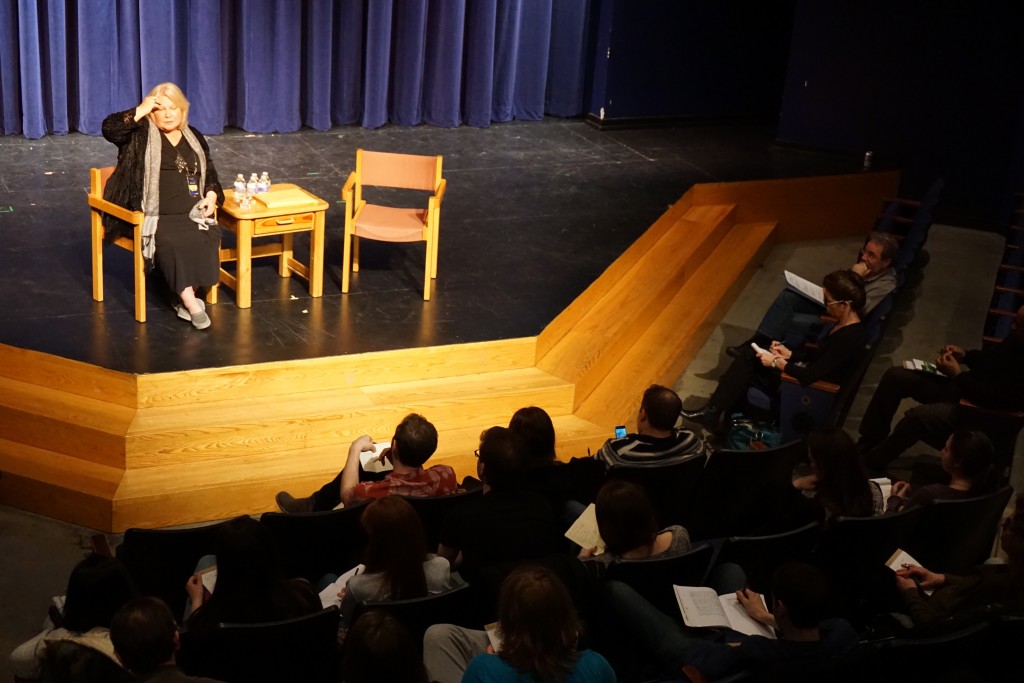
Editor’s note: Pipe Dream was not permitted to photograph or record audio at this event.
Alumni of various ages and backgrounds reunited this weekend to reflect upon one important thing they shared during their time at Binghamton University: the theatre department.
The first ever theatre alumni conference was held from Friday to Sunday, but began as little more than an idea of Tony Award-winning actor Ruben Santiago-Hudson, ‘78, who wanted to increase the theatre department’s presence at BU. For him, having alumni come back to the school and speak to students about navigating the professional theatrical world would be a testament to how much graduates of the program believe in it. Soon, he began coordinating the conference with Barbara Wolfe, the theatre department chair; Elizabeth Mozer, an assistant professor of theatre and Don Boros, an associate professor emeritus of the department.
Working together, they were able to create the conference, bringing in a diverse group of alumni back to their alma mater. The alumni who spoke at the sessions consisted of Ithaca College musical theatre professor Mary Corsaro, ’81, playwright and co-founder and director of the Wilkes University low-residency creative writing program Bonnie Culver ‘90, actor, screenwriter and director Jeremy Davidson, ‘94, clinical psychologist Jesse Rabinowitz, ‘79, emergency physician Andrew Wollowitz, ‘80, actor Victor Williams, ‘92, and Mozer and Santiago-Hudson themselves.
The sessions held for the conference, which included directing and auditioning workshops and discussions of diversity in theatre, served to give the student audience an idea of where a theatre degree could take you and how the alumni were working in and changing the field. Often, an alumnus would mention that their theatrical education taught them the interpersonal and listening skills needed to navigate any professional work environment they were in, implying that the lessons learned from the theatre department carried over to many facets of their lives off-stage.
Marisa Cartusciello, a sophomore majoring in theatre, attended the conference because she is interested in pursuing a career in theatre. She found that the talks she attended — including “What are musical theater and other industry professionals looking for?” — had helpful information about the industry and advice for those interested in theatre careers.
“There are so many people that will tell you that you have almost no chance and it is discouraging,” Cartusciello said. “But these talks were the exact opposite. They of course did not deny how hard it is to book a job but they encouraged us to go for it.”
According to Nicolas Coccaro, a junior majoring in theatre, Santiago-Hudson was a very strong force during the conference.
“First and foremost Ruben Santiago-Hudson … was a major presence in every section of the workshop,” Coccaro said. “[He] was constantly pushing the conversation forward in every session I attended, providing advice, clarifying questions from the students, polishing pearls of wisdom from the panelists or simply providing a light and humorous atmosphere aside the sometime serious business discussion.”
Regardless of their careers, however, many panelists shared one piece of common advice in their discussions: There’s no way of telling what will happen with your work, or what your marketability is when presenting your work in the industry. To best prepare for this, the only way you can make it is by working hard, making sure that the work is true to yourself and by constantly learning from your peers and your mentors.
“It was really encouraging and intriguing to not only have people to learn from and grow from, but people who have had extremely successful careers turn around and say, ‘never be content, always keep growing in your education,’” said Emily Enden, an attendee of the conference and a sophomore majoring in theatre. “It’s very encouraging to see and to know that people [in the theatre industry] are always growing.”
As motivating as the conference was for majors, it was also stressed that the lessons discussed in the different sessions applied to all people, no matter what field they’re in.
“Theatre is the connective thread,” Mozer said. “It can help musicians, politicians, scientists, teachers — just about anybody — and the one thing it allows us to do is walk in somebody else’s shoes. So it increases our capacity for empathy, and for understanding other people’s behavior, and the widening of our perceptions.”
Though this was only the first alumni conference that the department has held, the coordinators are confident that this event will happen again for many years to come.
“Right now, [the BU theatre department] is the cute-to-have-around department, and I don’t want to be cute to have around,” Santiago-Hudson said. “I want to be a significant part of the growth of this University, which is growing tremendously and beautifully — and I want us to be right in the middle of it.”


